Introduction
In recent years, the U.S. sanctions regime has targeted the world’s most egregious human rights violators. It has done so based on the 2016 Global Magnitsky Human Rights Accountability Act (the Magnitsky Act )* and the 2017 Executive Order (E.O.) 13818, which empower the U.S. government to impose “tangible and significant consequences on those who commit serious human rights abuse or engage in corruption, as well as to protect the financial system of the United States from abuse by these same persons.”*
Since then, the White House has used sanctions to target government organizations, officials, corporations, and private individuals engaged in the systematic violation of human rights around the globe. Such sanctions have been enacted against entities in Europe, the Middle East, Asia, and beyond. Unfortunately, the crimes committed against the Yemeni people by the Houthi rebels have gone largely overlooked. Fewer than 15 Houthi officials have been sanctioned in total, and the majority of those targeted are military officials who have been sanctioned for their role in destabilizing Yemen (E.O. 13611),* with minimal attention paid to Houthi violations committed against the population under their rule.
This report will focus on the Houthis’ systematic abuse of women and journalists. While these are tragically common phenomena in Houthi-controlled areas, they remain poorly documented. In addition to clearly documenting these abuses, the report will also map out the Houthi mechanics of repression: from the security forces responsible for unjustly arresting and harassing vulnerable individuals to those officials in the justice and prison systems responsible for subjecting the victims to torture and sham trials. The aim of this report is to raise awareness of Houthi human rights violations and provide informational support for efforts to penalize those who can and should be targeted with sanctions for their crimes.
Section 1: Women Targeted by the Houthi Regime
Women Systematically Detained, Tortured, and Raped by the Houthi Regime
The Houthis’ detention, torture, and rape of women is a systematic practice which has victimized between several hundred* to several thousand women.* The fabricated pretext for these grave violations of women’s basic rights is that they are engaged in some form of immoral behavior relating to prostitution or narcotics. In reality, the women targeted are most often those who are politically active against Houthi policies or are related to individuals that the Houthis seek to blackmail.
The rape of women prisoners is reportedly conducted under the guise of “purification.” This is the theological justification provided by the Houthis in which the Hashemite* male of superior lineage rapes a woman of inferior lineage and low moral standards in order to “purify her.”* The victims are sometimes recorded in sexually compromising positions, and this material is then used as leverage in order to blackmail them to confess to bogus charges or cooperate with the Houthis in some other fashion.*
In addition to the public shame that publicizing the rape would cause the victim and her family, due to the nuances of the honor culture of Yemeni society, it could also embroil her in severe legal troubles. According to the 2022 U.S. State Department report on human rights in Yemen:
By law authorities may prosecute rape survivors on charges of fornication if authorities do not charge a perpetrator with rape. According to law, without the perpetrator’s confession, the rape survivor must provide four male witnesses to the crime.*
Unless the victim can prove the sexual relations took place without her consent, and it is doubtful that she will have the required evidence to do so, a married woman can then be charged with adultery according to Yemeni law.
According to several reports, including the U.N. Panel of Experts, women in Houthi detention were more likely to be raped when held in secret detention centers rather official detention centers. The U.S. State Department cites a study noting that there are an estimated 230 official detention centers and an additional 298 unofficial/secret detention centers.* The exact locations of the secret detention centers are unknown, but they are generally believed to be in the basements of government facilities, homes that have been confiscated from the Houthis’ opponents, and mosques and schools commandeered by the Houthis.
Given the covert nature of these atrocities, the repression of free speech in Houthi-controlled territories, and the shame experienced by victims, the precise number of those disappeared, tortured, and sexually assaulted women is difficult to assess accurately. According to one victim whose testimony was included in a 2023 U.N. Report:
There were about 300 other women and girls, including minors as young as 12 years, who were abducted by the Houthis from different locations and arbitrarily detained at the Central Prison in Sana’a… most of these female detainees in the prison are held on trumped-up adultery or other “honour” related charges.*
The Yemeni Network for Rights and Freedoms claims that more than one thousand women have been unjustly detained between 2017-2020, including 770 cases of arrests and kidnapping, 195 cases of enforced disappearance, and 70 cases of torture.*
Despite the scale and systematic nature of the abuse, the U.S. government has previously sanctioned only two Houthi officials* for crimes that involved the systematic targeting of women (one of whom is now deceased).* However, there are many more senior officials involved in these crimes that yet remain relatively unknown.
The Houthi Perpetrators and their Victims
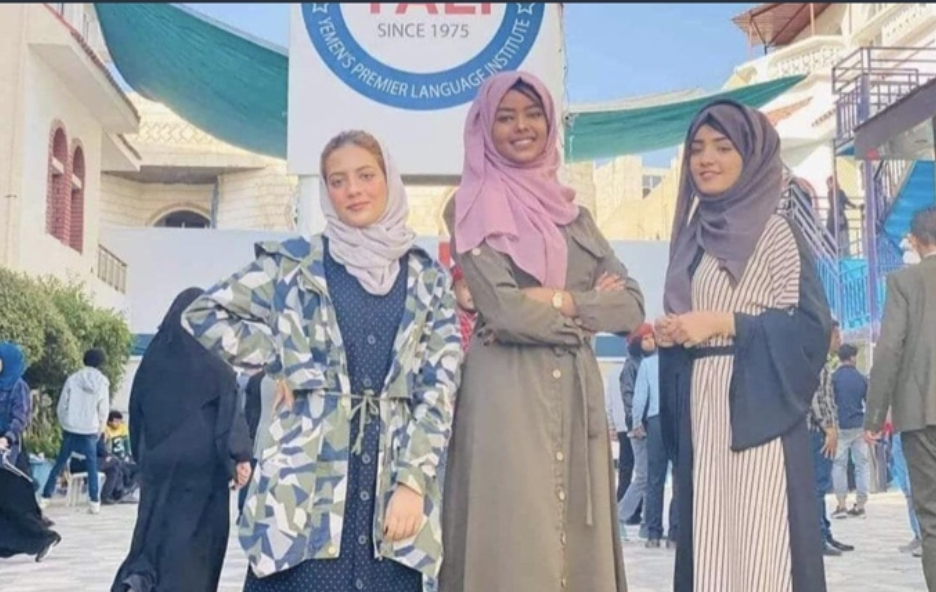
Yusra Al-Nashiri (left) and Entisar Al-Hammadi (center) prior to their detention and abuse by the Houthis on charges of “violating public morality.”*
Two recent high-profile cases of women being detained and abused at the hands of the Houthis are the abductions of young aspiring actresses and fashion models Yusra al-Nashiri and Entisar al-Hammadi.* In February 2021, the two were in Sanaa and on their way to film a Ramadan TV series when they were detained at a checkpoint by the Houthis and moved to a secret prison where they were subjected to harassment, abuse, and torture.*
During the course of their pre-trial detentions, al-Nashiri and al-Hammadi were offered the opportunity to be released and paid handsomely on the condition that they use drugs or sex to entrap prominent individuals who opposed the Houthis.* The Houthis hoped that the young women would help them to create kompromat that could then be used as blackmail against their opponents; the women refused and were then forced to stand trial on fabricated charges.
In November of 2021, al-Nashiri and al-Hammadi were convicted of immoral sexual behavior, drug use, and inciting other women to prostitution.* While their associates were handed lighter sentences, al-Nashiri and al-Hammadi were sentenced to five years in prison, and al-Hammadi continues to languish in prison at the time of the writing of this report. In February 2023, Al-Nashiri was released on bail due to failing health as a result of the abuse and poor conditions,* and she then seized the opportunity to escape to Amman where she was able to speak about her harrowing abuse at the hands of the Houthis.*
Given the opacity of the Houthi organization, it is not possible to identify all who should be accountable for the mistrial of justice carried out against al-Nashiri and al-Hammadi, but some of those involved can be identified. Despite the scant coverage they provided the trial, Houthi news sources* noted that those involved in overseeing the trial and prosecuting the case include:
- Chair: Judge Osama Abdulaziz al-Junaid (القاضي أسامة عبدالعزيز الجنيد)
- Public Prosecutor: Judge Yasser al-Zindani (القاضي ياسر الزنداني)
- Member of the Prosecution: Judge Adel Ahmed al-Da’ani (القاضي عادل الضاعني)
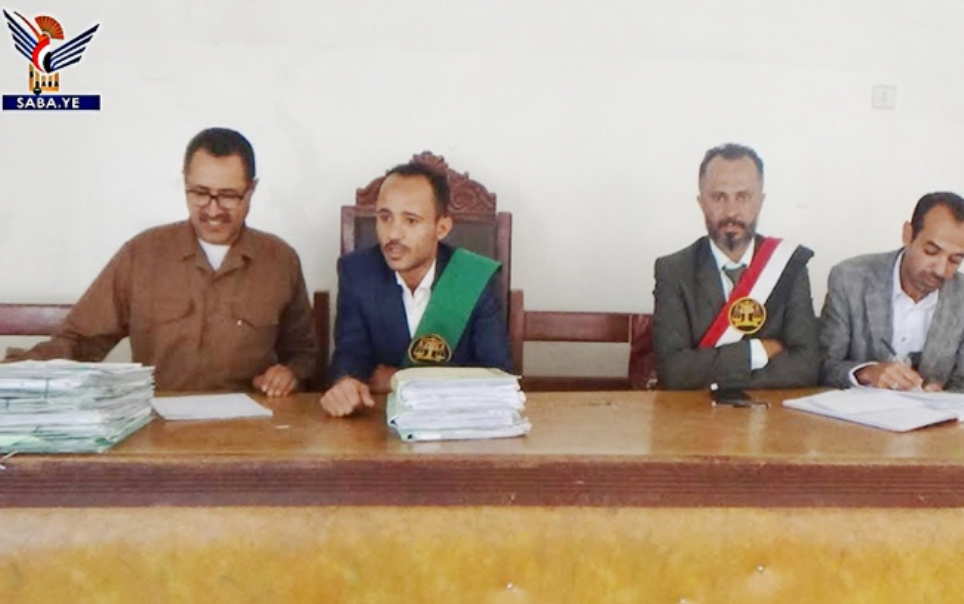
A photo from a 2021 article on the trial of al-Nashiri and al-Hammadi, portraying the Houthi Justice officials working on the case. Judge Al-Junaid is second from the left and wearing the green sash.*
In addition, several sources noted that al-Hammadi was subject to severe beatings in prison by members of the all-female zainabiyat troops, which were stood up specifically to enforce Houthi control over the women of Yemen.* The zainabiyat have been accused by the U.N. of facilitating rape and other atrocities in Houthi detention facilities.* The individuals who are allegedly responsible for al-Hammadi’s abuse include “Um al-Karar”* and “Um Zaid,” both of which are pseudonyms.* Um al-Karar was previously reported to have beat female prisoner Aisha al-Matari so mercilessly that the latter opted to commit suicide.* Um al-Karar is alleged to be an individual known as Karima al-Maroni (كريمة المروني),* while Um Zaid’s identity remains unknown.
Additional Houthi officials overseeing the law enforcement and criminal justice system responsible for the detention, abuse, and sham trials of women (including al-Nashiri and al-Hammadi) are as follows:
Major General Abdelkarim Amir al-Din al-Houthi (اللواء عبدالكريم أمير الدين الحوثي) is a paternal uncle to the group’s leader Abdelmalik al-Houthi and one of the most influential officials in the movement.* He also serves as the Houthis’ interior minister which charges him with overseeing domestic security and law enforcement services, including both the police and political/ideological agencies such as Security and Intelligence Service and the zainabiyat.* According to a 2022 article by Michael Knights, Abdelkarim has “close ties to the IRGC [Iran’s Islamic Revolutionary Guard Corps] and Lebanese Hezbollah.”*
His deputy is Major General Abdulmajeed al-Mortada (اللواء عبدالمجيد المرتضى).*
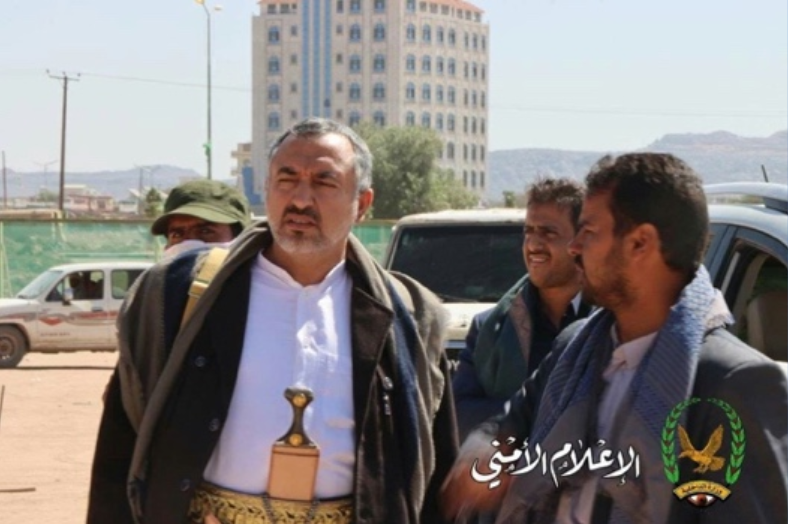
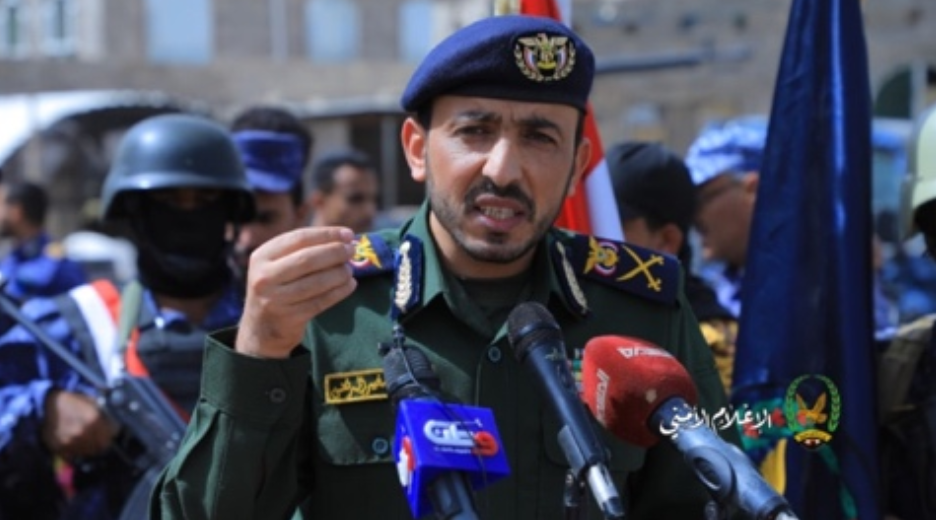
Interior Minister Major General Abdelkarim Amir al-Din al-Houthi (left)* and Deputy Interior Minister Major General Abdulmajeed Al-Mortadha (right).*
- Mohammed Ali al-Houthi (محمد علي الحوثي) is a cousin of the group’s leader Abdelmalik al-Houthi. He is most well-known for his role as chairman of the Houthis’ Supreme Political Council, but it is also worth noting Mohammed Ali al-Houthi’s lesser-known role overseeing law enforcement as the “head of the Justice System.”*
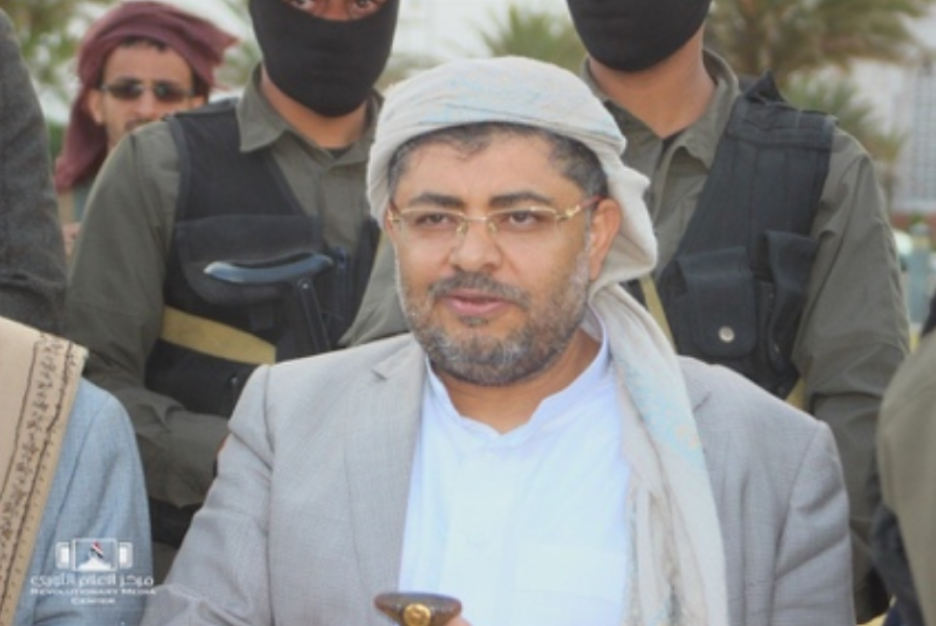
Mohammed Ali al-Houthi (center) serves as the head of the Houthi Justice System.*
-
Nabil Nasser al-Azani (القاضي نبيل ناصر أحمد محمد العزاني) currently serves as the Houthis’ minister of justice.* Al-Azani has defended the Houthis’ justice system against U.N. condemnation* after the public execution of nine individuals who were denied fair trial, including one minor who had been tortured by the Houthis to the point of paralysis. Al-Azani observed that critical statements by the U.N. are “unacceptable and contradict the principles and charters of the United Nations, reveal the lack of credibility and impartiality of the organization… the Yemeni judiciary operates in accordance with the principles proclaimed in the Charter of the United Nation.”* He previously served as the Houthis’ attorney general, including during the period in which al-Nashiri and al-Hammadi were initially detained.*
His deputy is Dr. Ismail Ibrahim Al-Wazir (الدكتور إسماعيل إبراهيم الوزير).*
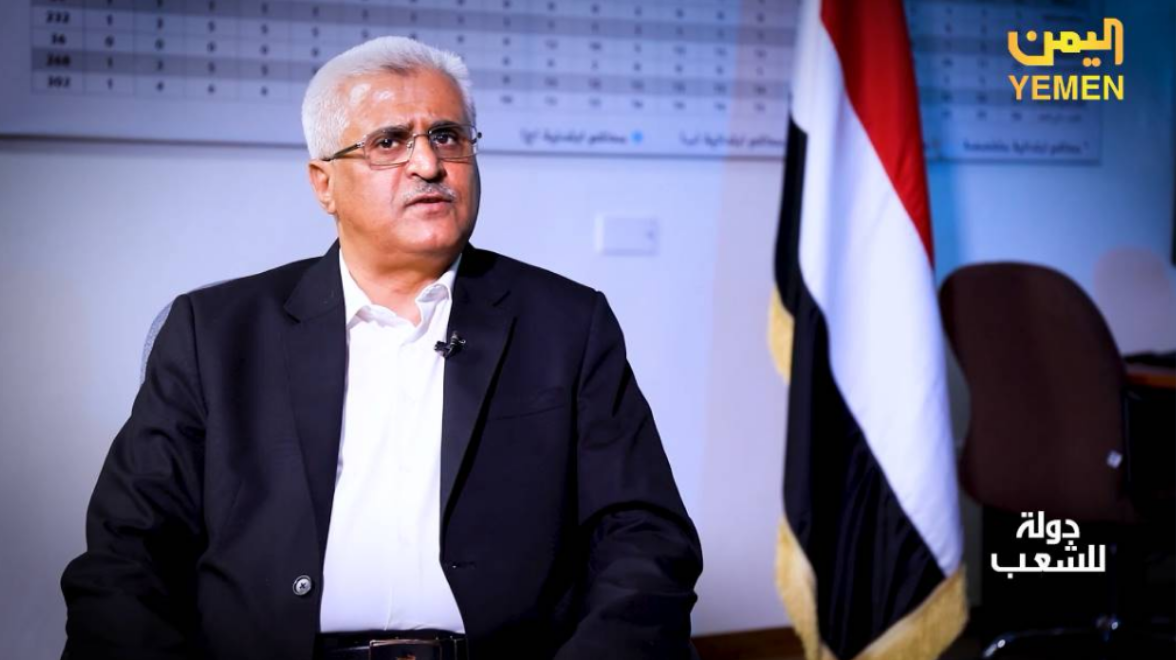
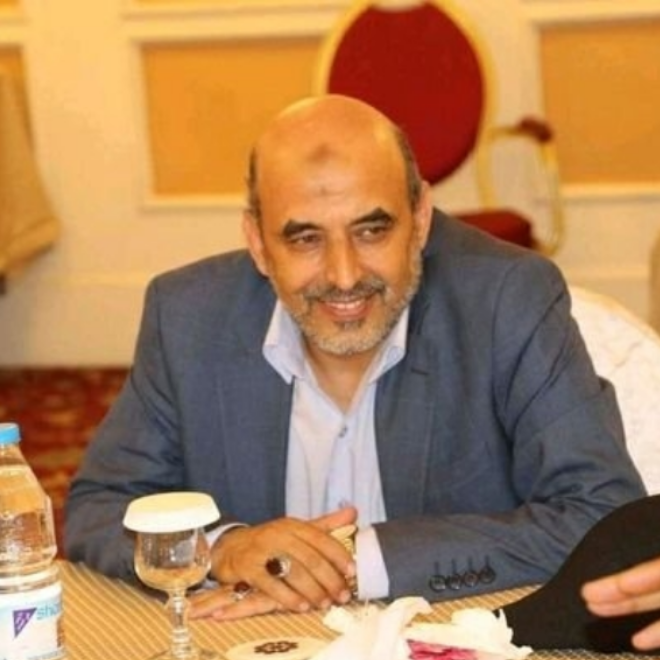
Minister of Justice Nabil Nasser al-Azani* (left) and Deputy Minister of Justice Dr. Ismail Ibrahim al-Wazir (right).*
- Muhammad al-Dailami (القاضي الدكتور محمد بن محمد بن عبد الله بن محمد الديلمي) is the Houthis’ attorney general and is charged with overseeing the state’s prosecution of offenders. In addition, he has the authority to inspect prisoners’ conditions* and to allow for their early release.* He occupied this post during the trial of al-Nashiri and al-Hammadi in 2021,* and his tenure continues at the time of writing. He previously served as the Houthis’ minister of justice.*
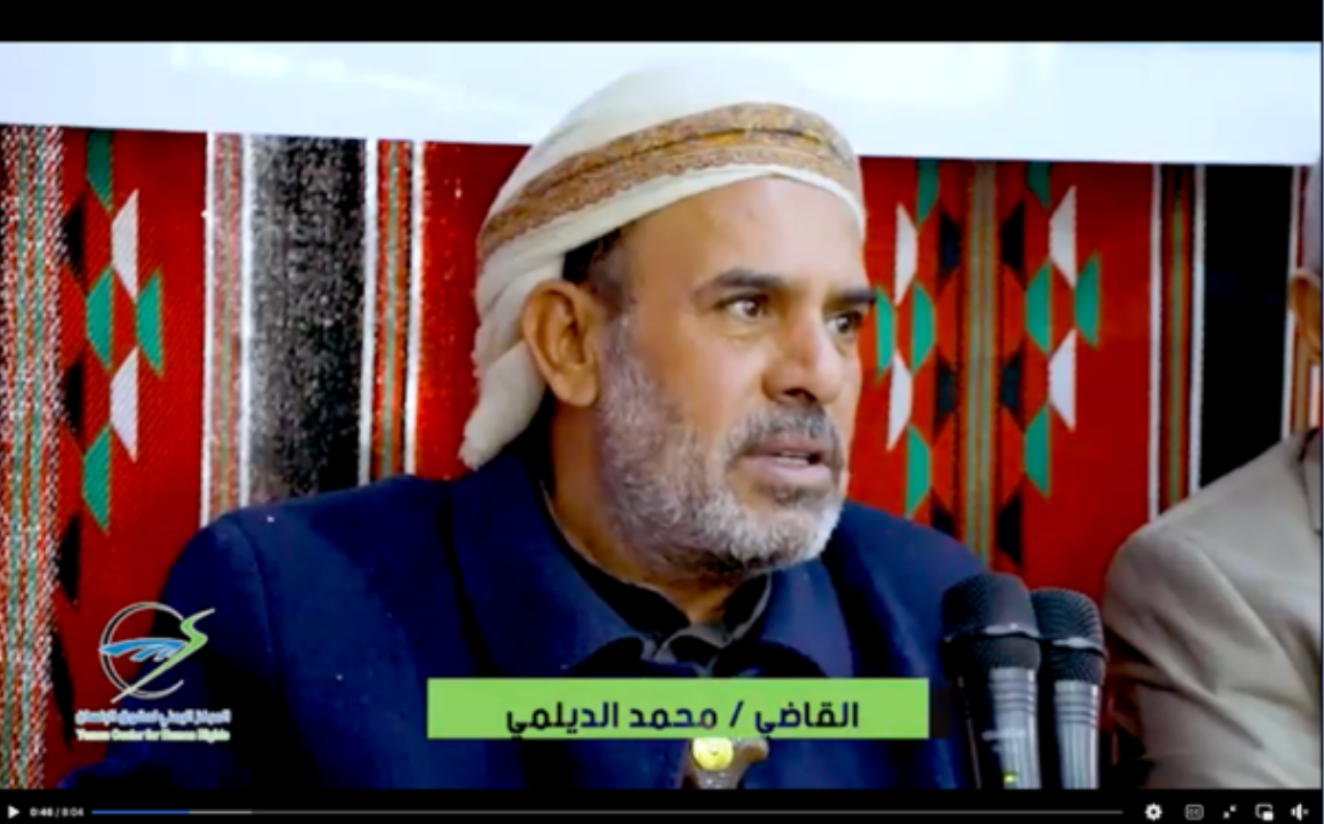
Houthi Attorney General Muhammad al-Dailami.*
-
Ahmed Yahya al-Mutawakel (القاضي أحمد يحيى محمد علي المتوكل) heads the Houthis’ Supreme Judicial Council (SJC). The SJC oversees the function of the courts and judges to ensure that they are operating to the satisfaction of the Houthi leadership.* For example, if Judge Osama al-Juneid was overseeing the case against al-Hammadi and al-Nashiri and ruled in the defendants’ favor against Houthi wishes, the SJC would have been the body responsible for removing him due to “poor performance.” A 2020 report by the U.N. noted the SJC’s role in the Houthis’ targeting of women under the guise of “crackdowns” on prostitution networks*
Saad Ahmed Hadi (القاضي سعد أحمد حسن هادي) is the secretary-general of the SJC.*
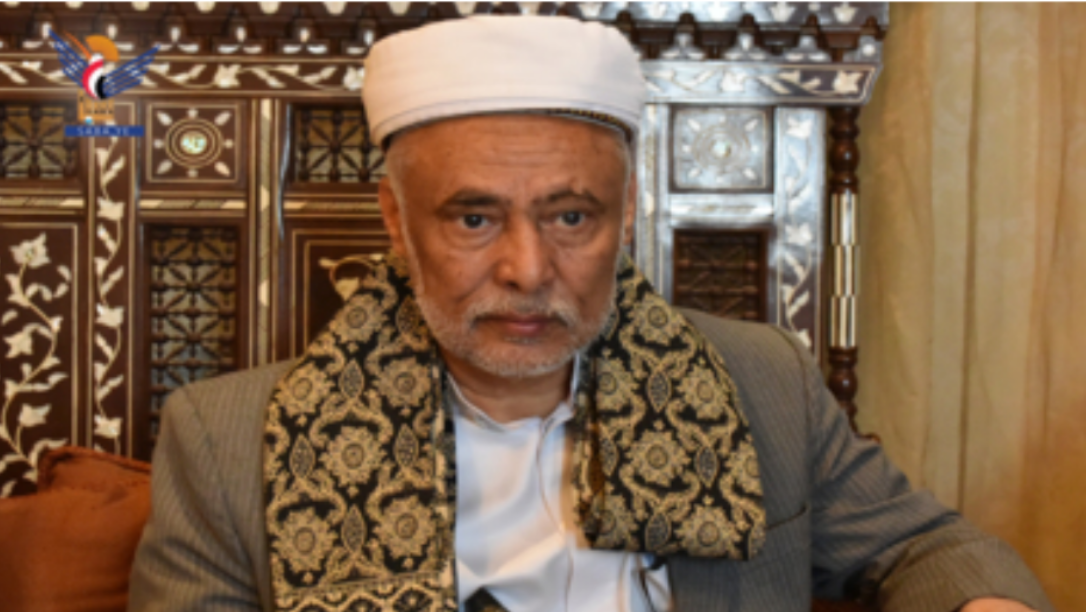
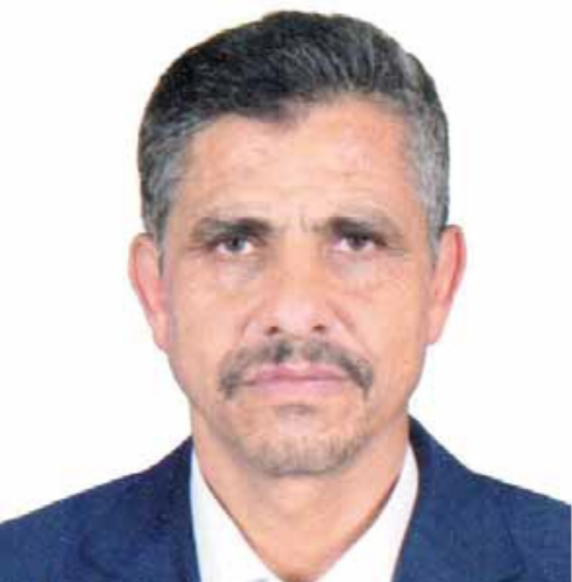
Head of Supreme Judicial Council Ahmed Yahya al-Mutawakel (left),* and Secretary-General of the Supreme Judicial Council Saad Ahmed Hadi (right).*
Section 2: Journalists Targeted by the Houthi Regime
Journalists Systematically Detained and Tortured by the Houthi Regime
Yemen is one of the most repressive information environments in the world, and the Houthis in particular have devoted an exceptional amount of resources to promoting their own narrative and filtering out any information that does not comport with it.* The group has founded or coopted a number of media outlets to serve as Houthi mouthpieces including al-Masirah, al-Sahat, Saba Net, al-Thawra, Yemeni Press, and Ansarollah.com. In parallel, it has used its control of Yemen’s internet gateway to filter out sources of information it deems hostile—reportedly using existing capabilities* as well as acquiring new deep packet inspection capabilities to do so.* Unfortunately, Houthi targeting of opposition media outlets is not limited to blocking their websites, but journalists who present opposing or critical perspectives are imprisoned and tortured as well.
The following section will examine instances in which the Houthis arrested, tried, and sentenced journalists and prominent media figures. In particular, it will focus on a collection of journalists imprisoned in 2015, a group of YouTube content creators detained and then jointly tried in early 2023, and the secret trial’s taking place in Hodeidah’s Specialized Criminal Court. Investigating the process by which these individuals were detained and tortured will be useful in understanding the systemic nature of the problem as well as the individuals responsible for these gross violations of human rights.
The Houthi Perpetrators and their Victims
Journalists
In the summer of 2015, nine Yemeni journalists were arrested by the Houthis in Hotel Dream Castle in Sanaa. In 2020, all of them were convicted by the Specialized Criminal Court in Sanaa (SCC-Sanaa) but their sentences varied considerably; five were sentenced to prison and then probation, while the other four (Tawfiq al-Mansouri, Abdelkhaleq al-Amran, Akram al-Waleedi, and Hareth Humaid) were convicted of “espionage for foreign states and spreading fake news” and sentenced to death.* Amnesty International describes the trials of the four journalists placed on death row as follows:
They were sentenced to death on 11 April 2020 by the Specialized Criminal Court in Sana’a following a grossly unfair trial in which their lawyer was barred from attending nearly all court sessions, and without informing their lawyers and families of the death sentence. Their lawyer had appealed the verdict, and the Specialized Criminal Appeals Division in Sana’a had postponed the appeal hearing at least 10 times.*
The defendants’ lawyer, Abdulmajeed Sabra, was also charged with “cooperating with the countries of aggression”* and then put on trial for his role in defending the journalists and appealing their sentences.
In addition, throughout their detention, the journalists on death row were subject to torture. As Tawfik al-Mansouri recounted, “We passed out more than once in every torture session to the point where we wished to die so that the suffering would end.”* Al-Mansouri also noted that Abdulqader al-Mortada, the Houthis’ chairman of the National Committee for Prisoners Affairs, personally took part in torturing detainees.*
The four journalists were eventually released by the Houthis in a prisoner exchange on April 16, 2023.
The following Houthi officials were part of the journalists’ sham trial and torture:
- Chair: Judge Muhammad Muflih ( القاضي محمد مفلح)*
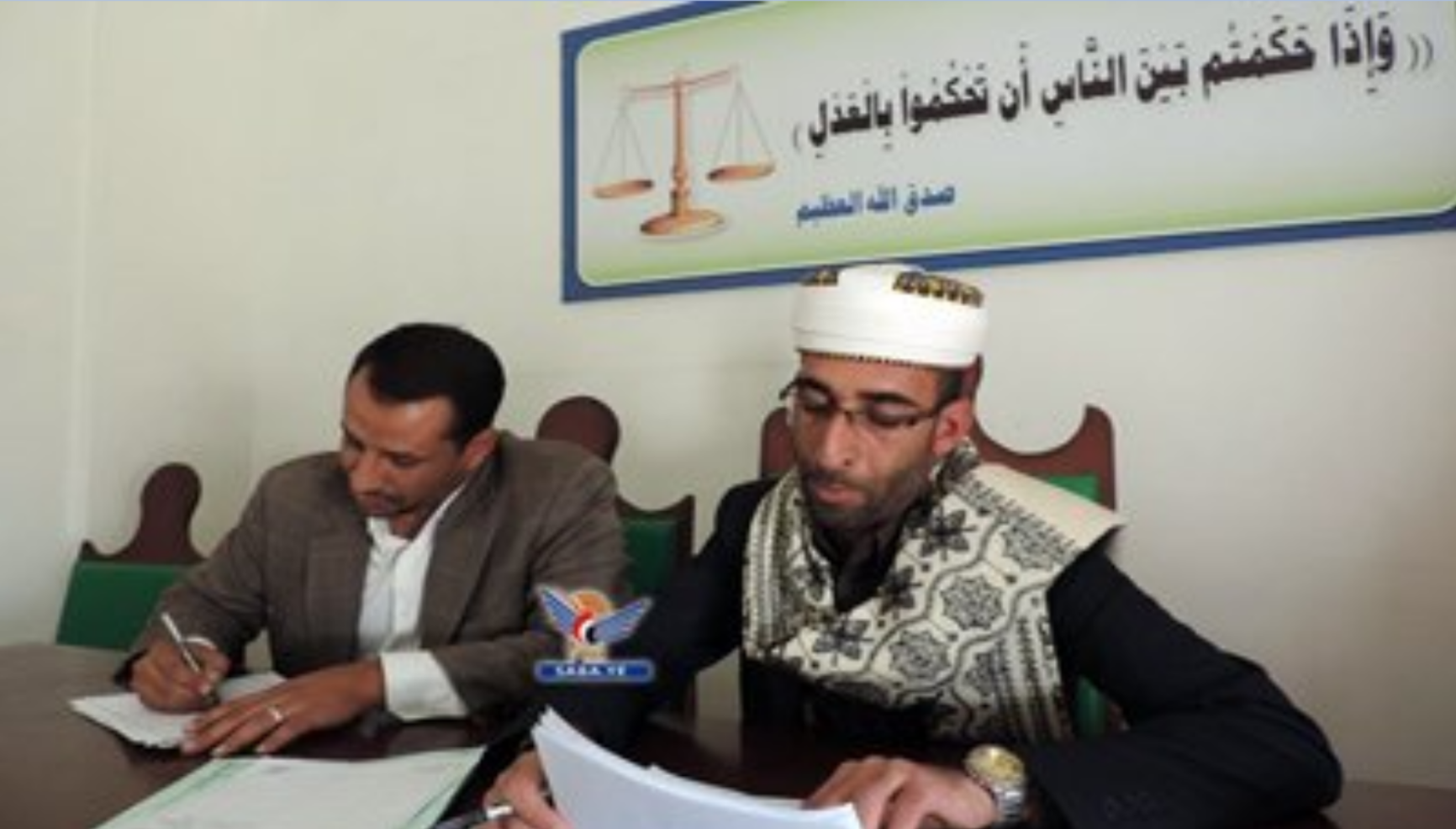
Muhammad Muflih (right)* is a fanatical Houthi supporter who was appointed to serve as a judge in SCC-Sanaa and has taken on a number of cases related to “national security.”
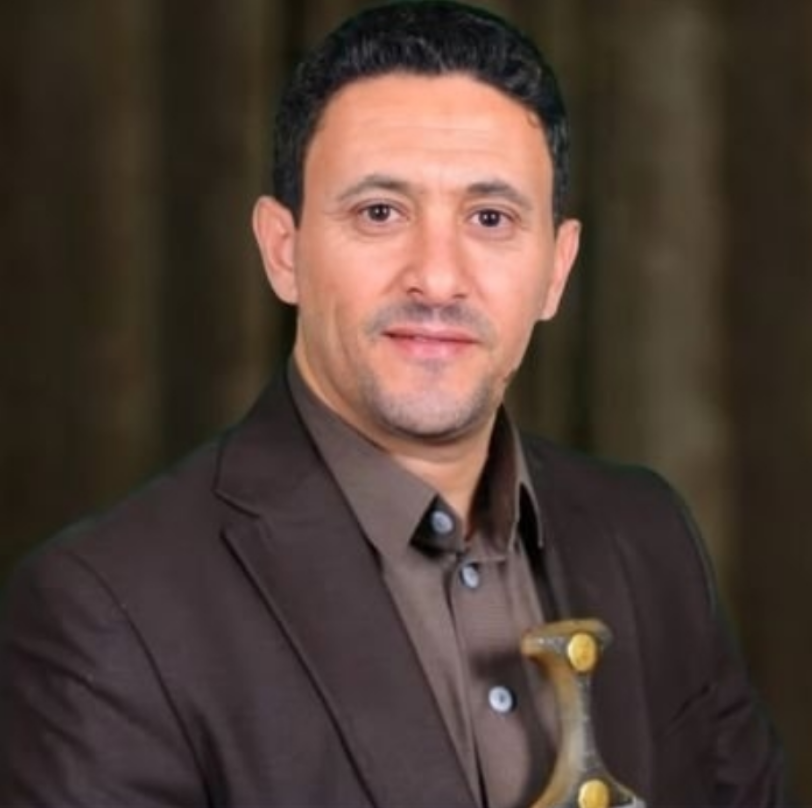 Chairman of the National Committee for Prisoners Affairs: Abdulqader al-Mortada (عبد القادر المرتضى)*
Chairman of the National Committee for Prisoners Affairs: Abdulqader al-Mortada (عبد القادر المرتضى)*
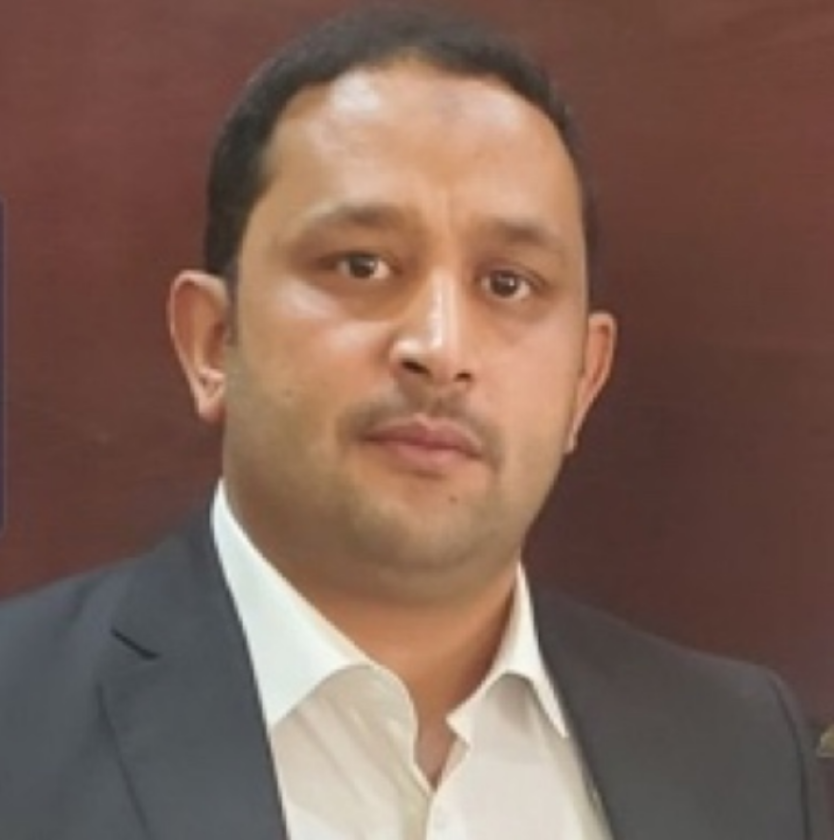 Deputy Chairman of the National Committee for Prisoners Affairs and alleged partner to al-Mortada’s torture activities: Murad Abu Hussein (مراد ابو حسين)*
Deputy Chairman of the National Committee for Prisoners Affairs and alleged partner to al-Mortada’s torture activities: Murad Abu Hussein (مراد ابو حسين)*
- Brother of Abdulqader al-Mortada and alleged partner to his torture activities: Abu Shehab al-Mortada (أبو شها#1576; المرتضى)*
Abu Shehab is a pseudonym, and his official name is unknown.
YouTube Content Creators
In December of 2022, the Houthis Security and Intelligence Service arrested three YouTube content creators (Mustafa Al-Mawmari,* Ahmed Hajar,* and Ahmed Allaw*) after they had each uploaded content critical of the regime’s corruption and dysfunction.* According to Houthi news sources, for their criticisms of the regime, the social media influencers were charged with “disturbing public security and harming the public interest.”
Just before the conclusion of the trial, on March 20, 2023, Houthi media released a YouTube clip of the accused confessing to the charges.* The following day, on March 21, SCC-Sanaa handed each of them a sentence ranging from one to three years. However, less than two weeks after sentencing, President Mahdi al-Mashat declared that Al-Mawmari and Hajar would be pardoned and released.* Allaw’s fate remains unknown at the time of writing, but Houthi-affiliated accounts and media outlets claim that he was released in mid-April.*
Houthi news sources noted* that those involved in overseeing the trial of the YouTube stars and prosecuting their case include:
- Chair: Yahya Abdul Karim al-Mansour (القاضي يحيى عبد الكريم المنصور)
- Public Prosecutor: Sarim al-Din Mufaddal(القاضي صارم الدين مفضل)
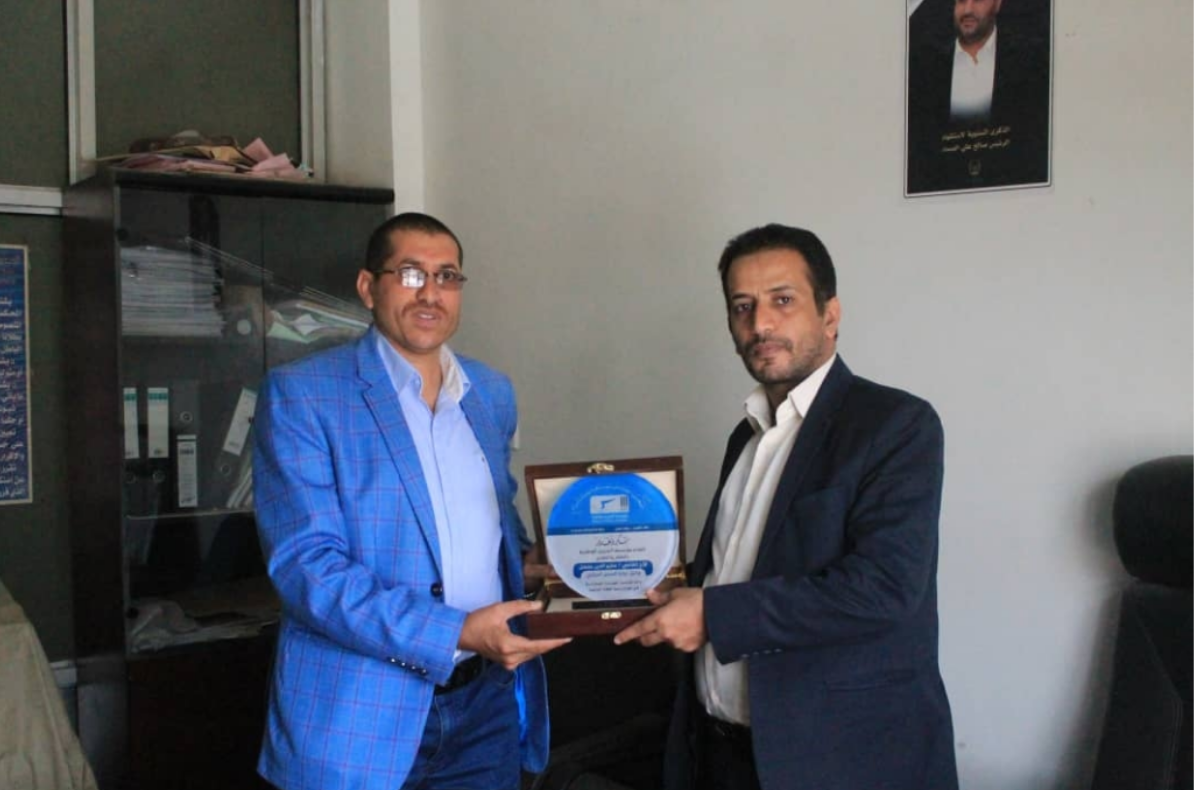
Public Prosecutor Sarim al-Din Mufaddal (right) received an award in 2019 from the Houthi-aligned National Prisoner Foundation.*
- Member of the Prosecution: Khaled Omar (القاضي خالد عمر)
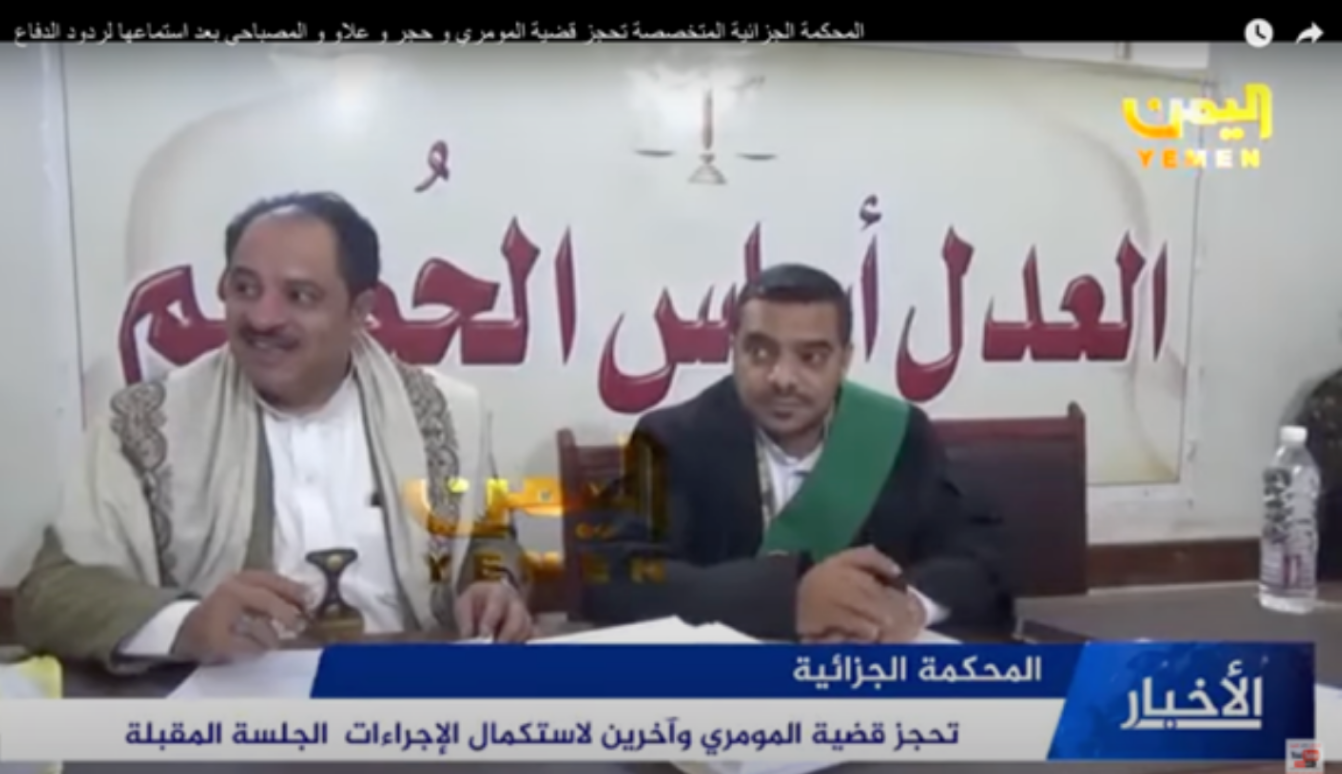
In a video clip from the YouTube influencers’ trial, Yahya al-Mansour (right) is seen in the courtroom.*
- President of the SCC-Sanaa, in which the abovementioned journalists and YouTube influencers were convicted:* Mujahid al-Amdi (القاضي مجاهد العمدي)
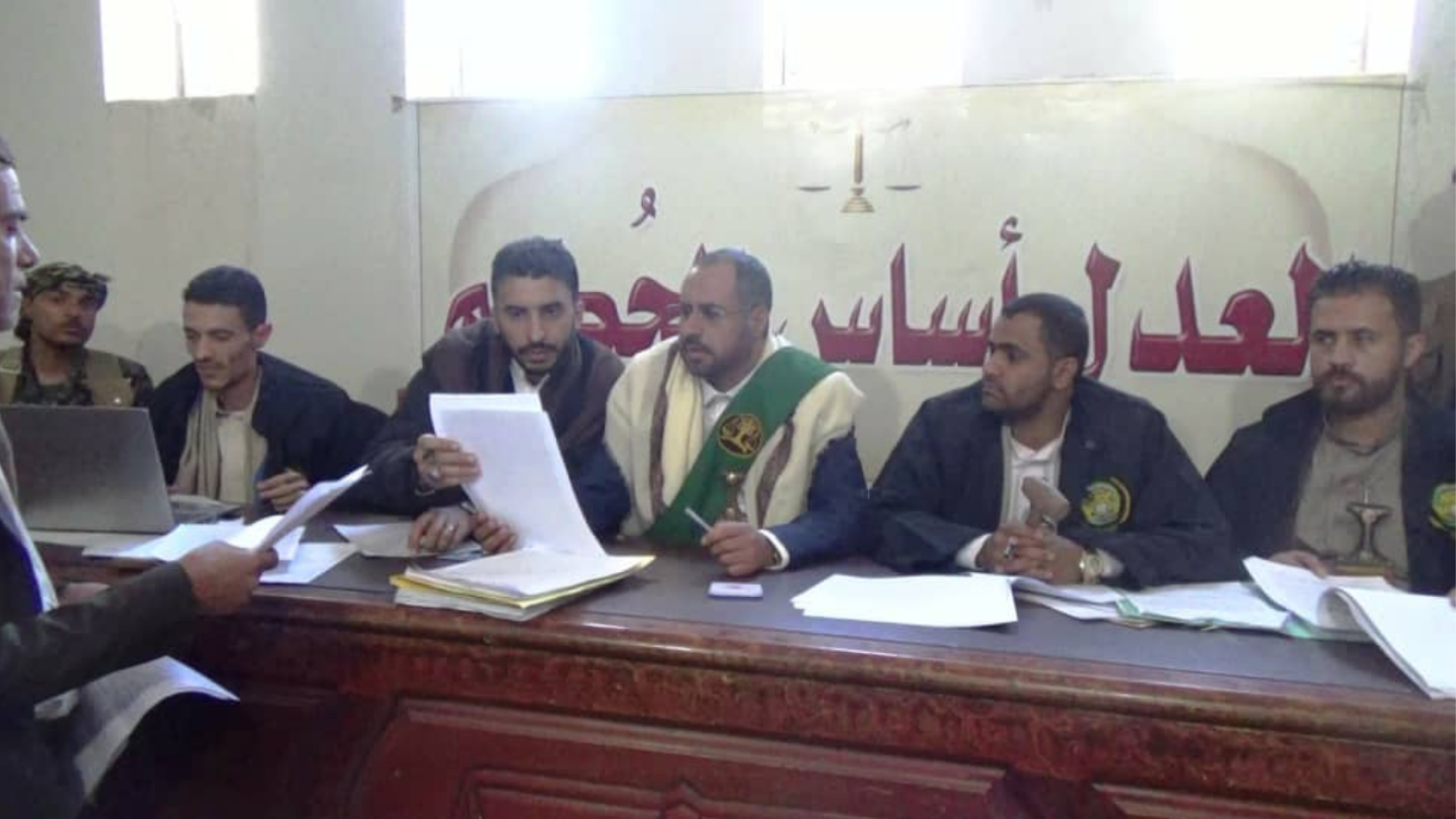
Mujahid al-Amdi (center)* is responsible for overseeing the SCC-Sanaa which is responsible for many trials touching upon core Houthi interests, which are often described in Houthi media as issues of “national security.”
Secret Trials in Hodeidah
The Specialized Criminal Court in Hodeidah (SCC-Hodeidah) also targets those accused of undermining Houthi interests, including journalists. However, little is known about the activities of SCC-Hodeidah because “due process” is often conducted behind closed doors and shrouded in secrecy.* There are no publicly available records of many of the trials convened by SCC-Hodiedah, several of which have resulted in the conviction and sentencing of journalists and others unjustly accused of sedition.
Mohammed al-Salahi and Mohammed al-Junaid are two journalists who have languished in Houthi prisons since their arrests on charges of “assisting the enemy” in 2018.* In 2022, after both were convicted by the SCC-Hodeidah, they were each sentenced to terms of three years and eight months which should have allowed for their release shortly after sentencing due to time served. However, for unknown reasons the journalists remained in detention for approximately one year beyond the completion of their full prison sentence,* and at the time of writing, July 2023, there are initial and unconfirmed reports that the Houthis have finally released them.*
SCC-Hodeidah was also responsible for overseeing the arrest and detention of a 13-year-old boy, who was then tortured to the point of paralysis before being publicly executed by a firing squad.*
Despite the secrecy surrounding the SCC-Hodeidah court system, there is some information available regarding the senior officials overseeing it. Those officials and their roles in the SCC-Hodeidah, both at present as well as during the period in which some of the abovementioned violations took place, include:*
- President of the SCC-Hodeidah: Amin Zabara (القاضي أمين زبارة)
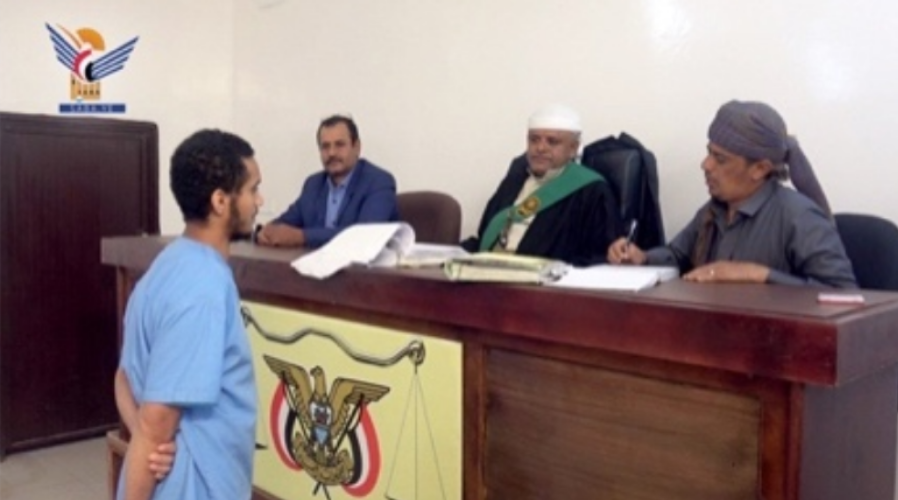
Amin Zabara (second from right and wearing a white cap and green sash) oversees SCC-Hodeidah.*
Chief of Criminal Prosecution in SCC-Hodeidah: Ahmed Al-Shami (القاضي أحمد الشامي)
Prior to assuming his role as chief in January 2023, al-Shami served as deputy chief.
-
Head of Appeals at the Prosecutor’s Office in SCC-Hodeidah: Abdul Hafeez Al-Mahbashi (القاضي عبد الحفيظ المحبشي)
In the 2021 trial to prosecute those accused of orchestrating the assassination of Houthi President Saleh Al-Sammad, al-Mahbashi upheld the death sentences of 10 people (including a paralyzed minor).*
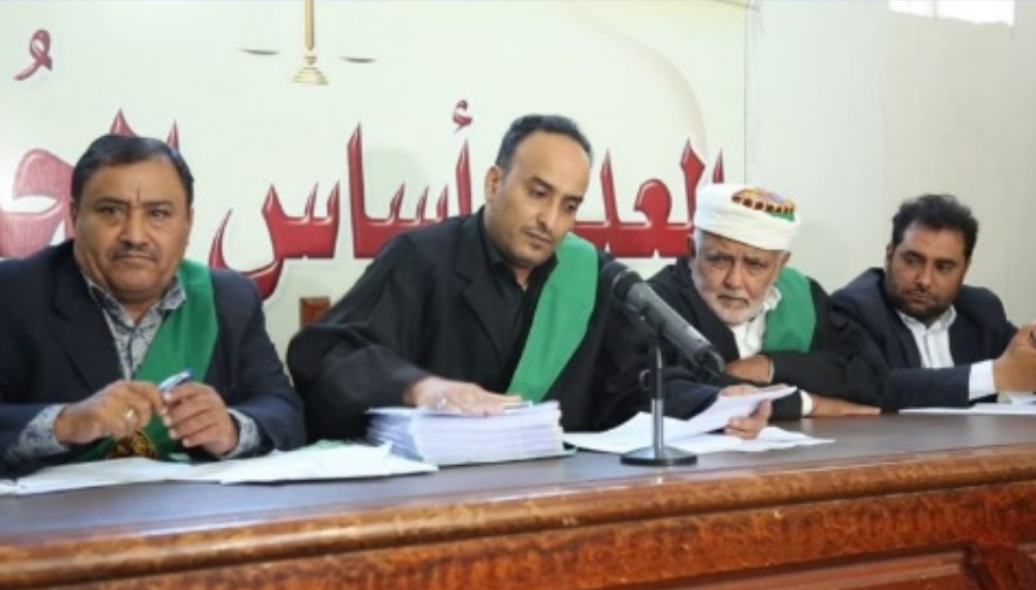
Judge Abdul Hafeez al-Mahbashi (second from left) serves as head of SCC-Hodeidah’s Appeals Division.*
- Former Chief of Criminal Prosecution in SCC-Hodeidah (served until January 2023): Waddah al-Qurashi (القاضي وضاح سلطان القرشي)
Al-Qurashi currently serves as head of appeals at the Prosecutor’s Office in SCC-Sanaa.
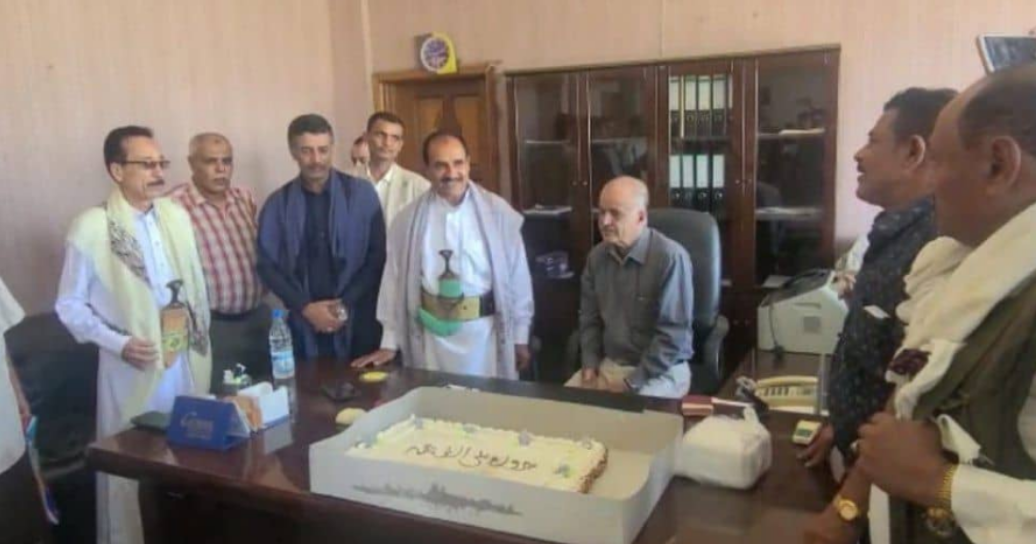
A farewell sendoff for Judge al-Qurashi (seated in the office chair at the center of the photograph) from his colleagues at SCC-Hodeidah before his departure to assume a new role at SCC-Sanaa.*
Conclusion
The Houthis exploit their command of law enforcement agencies in order to control the population living under their rule. That is to say, the goal of arresting, trying, and convicting citizens on trumped up charges is not to imprison them but to force them to behave a certain way. For example, when women are arrested and abused, the aim is often to get their families to pay exorbitant sums for their release or to compel the women to participate in depraved Houthi schemes to compromise their political enemies. When journalists are arrested, the primary aim is to pressure them not to speak up about Houthi abuses and poor governance. Whatever their motives in each case, Houthi officials who tortured their citizens and denied them justice are guilty of the systematic violations of their citizens’ basic rights.
These Houthi officials must be held accountable for their crimes. There is little hope for true justice in the Houthis’ court system—and so any accountability for these crimes will necessarily come from elsewhere.
These individuals ought to be sanctioned under the Magnitsky Act for their participation in the gross violation of human rights. The Western media, in solidarity with their Yemeni counterparts who are suffering Houthi abuse, should not provide these individuals with any platform for their cynical and grotesque worldview on media* or social media.* The U.S. government should also encourage its allies and partners around the globe to refuse entry for any purpose whatsoever to the perpetrators and their associates.
 TOP
TOP